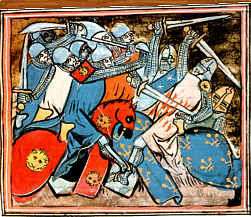Battle of Tagliacozzo
| Battle of Tagliacozzo | |||||||
|---|---|---|---|---|---|---|---|
 |
|||||||
|
|||||||
| Belligerents | |||||||
|
Anjou (Guelph) |
Hohenstaufen (Ghibelline) |
||||||
| Commanders and leaders | |||||||
| Charles of Anjou | Conrad V (Conradin) | ||||||
The Battle of Tagliacozzo was fought on 23 August 1268 between the Ghibellines supporters of Conradin of Hohenstaufen and the army of Charles of Anjou. The battle represented the last act of Hohenstaufen power in Italy. The end of Conradin marked also the fall of the family from the Imperial and Sicilian thrones, leading to the new chapter of Angevin domination in Southern Italy.
The German emperors of the Hohenstaufen line, who had inherited the kingdom of Sicily from its Norman rulers in 1197, had continually attempted to consolidate their more long-standing claims to northern Italy as well—an ambition which was vehemently opposed by many northern Italian states and by the papacy. The resulting struggle between the papacy and the Holy Roman Empire split the loyalties of many Italians and led to factionalism, the resulting factions being termed the Guelphs and Ghibellines. The death of the German emperor Frederick II of Hohenstaufen in the midst of this struggle found his legitimate heir as King of Sicily, Conradin, in southern Germany, and Sicily under the rule of Conradin's uncle, Manfred of Sicily, the illegitimate son of Frederick II. Manfred's rule in Sicily was at first de facto—at times along with his legitimate half-brother, Conrad IV, at other times as regent for Conradin—but in 1257 Manfred simply declared himself king, despite Conradin's claim to the kingdom, purportedly because of rumors of Conradin's death.
Pope Clement IV, determined to check Manfred's growing power, excommunicated him and continued discussions with Charles of Anjou as a secular prince who might, by force of arms, replace the dangerous Hohenstaufens. (These discussions with Charles of Anjou had been initiated by Clement's predecessor, Pope Urban IV, another French pope.) Bolstered by papal resources, which included a crusading tithe granted to combat the "infidel" Hohenstaufen, Charles entered Italy and defeated Manfred at the Battle of Benevento, and began to establish himself as King of Sicily.
...
Wikipedia
